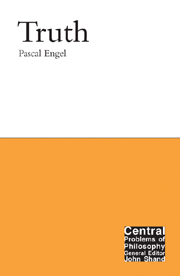4 - The realist/anti-realist controversies
Summary
Minimal realism, like Wright's minimalism, implies that the realist/anti-realist issues will be distinct from domain to domain. In a sense, it is obvious. For the fact that one is, say, a realist in mathematics who takes numbers to be abstract entities belonging to a separate realm does not imply that one has to be a realist in ethics, for instance – by contrast with the purity of Cantor's paradise, the realm of human feelings might seem to us such a messy place that it does not allow us to take values as real entities – and an expressivist in ethics can well be a realist about scientific theories. One might think that the combination of realism in science and of anti-realism in the philosophy of mathematics is less obvious, for if mathematics is to be applied to the natural world, how can mathematical entities fail to be real? But it is perfectly consistent with anti-realism in Dummett's sense, and with intuitionism, to accept a form of realism about the entities that science speaks about. So one does not need to be a global realist or a global anti-realist in all areas. But it remains to be seen how this can happen in various domains and whether we can afford to have all the possible combinations. There are many such domains in philosophy today, not only those already mentioned, but every domain where we can ask whether truth-aptness may escape us, or where we can ask whether the very notion of truth conditions has sense.
- Type
- Chapter
- Information
- Truth , pp. 99 - 124Publisher: Acumen PublishingPrint publication year: 2002



